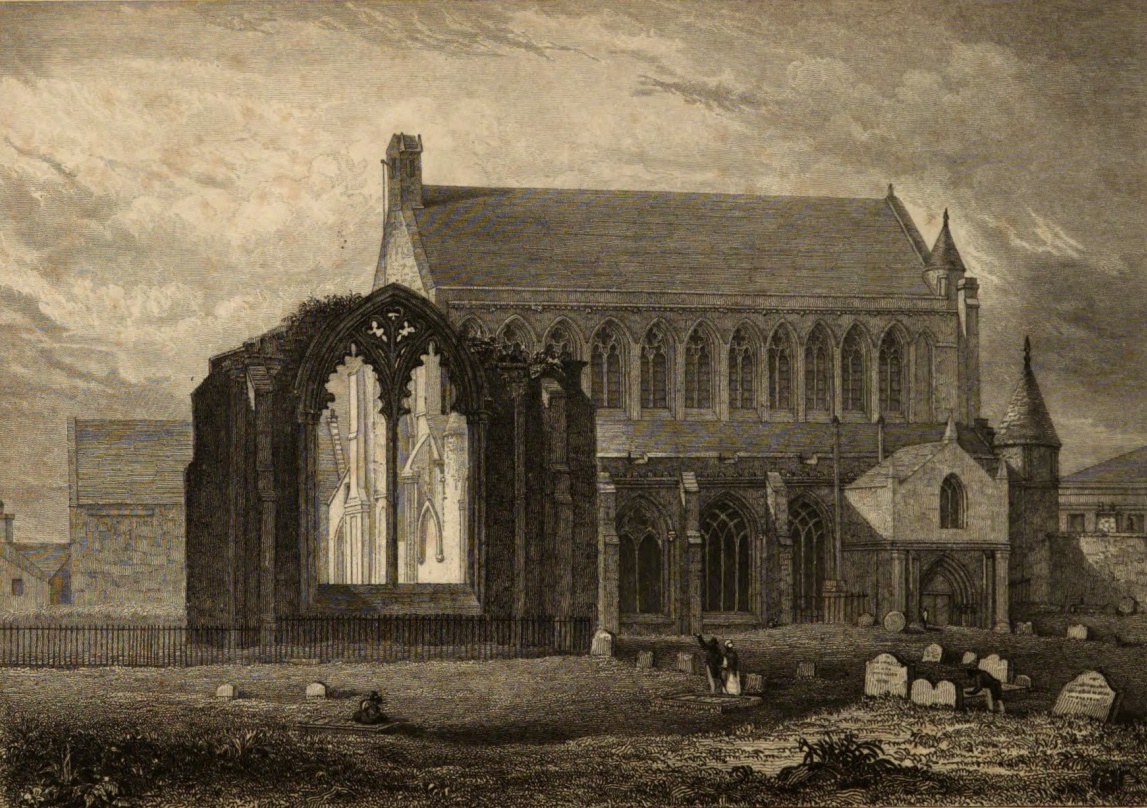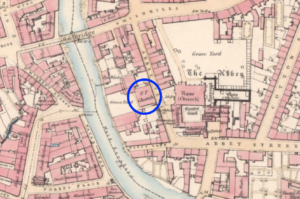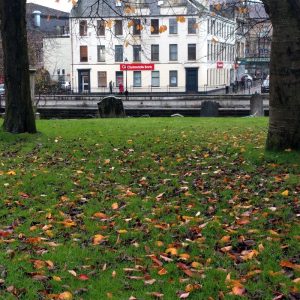
On 2 March in Aberdeen, outlining his plans for the next two weeks, Frederick Douglass told his Irish publisher, ‘I shall be in Glasgow on the fourteenth and shall remain there and in its vicinity several days’.1 He was anxious to take delivery of more copies of his autobiography to sell at his lectures.
On Tuesday 17 March he and James Buffum addressed the first of three meetings that week at the United Secession church in Abbey Close, adjacent to the rather more imposing Paisley Abbey. The Abbey still dominates the town today, and still operates as a place of worship. Of Rev. Mr Nisbet’s church today all that remains are a few grave stones in an open area of grass beside the Town Hall.


We reproduce here the report in the Renfrewshire Advertiser, which covered all three meetings on 28 March.
For an overview of Frederick Douglass’ activities in Paisley during the year see: Spotlight: Paisley.
AMERICAN SLAVERY
On Tuesday evening last week the eloquent American fugitive slave, Mr Frederick Douglas, and his friend James N. Buffum, addressed a large meeting in the Rev. Mr Nisbet’s church on slavery.
Mr Douglas on rising said – I experience great pleasure in addressing such a large audience, assembled for the purposes of hearing the wrongs inflicted upon my brethren across the Atlantic. The audience cannot be too small to interest me in speaking on such a subject, and if I had but one dozen of an audience I would feel pleasure in addressing them.
I am anxious that all people should understand, and I am come here to impart accurate information respecting the workings of American slavery. I am one of those who believe that slavery is to be abolished by revealing its outrages upon its victims, by exposing it to the gaze and indignation of the christian world. In order to accomplish this, it is necessary for us to leave our homes that correct information may be spread regarding this system of gross fraud, so that it may be swept from off the land. And will any person dispute my right of being here?
I have been asked, why not employ my talents to burst asunder the strong fetters by which you, the people of England, are bound? I am not the man to speak lightly of any wrongs existing in England, but the evils stalking abroad in this land are nothing like American slavery. If you have the slightest approach to slavery, I will do all in my power to crush it, but I utterly deny you have the least shadow of it.
What is slavery? There seems to be a great want of information regarding it. It is not a system whereby a man is compelled to work, it is not slavery to have one peculiar right struck down; if it is, all women, all minors, are slaves. I protest against the use of the term slavery being applied in such a manner – it is an awful misnomer. Slavery must be regarded as something different; it must be regarded as one man holding property in another, subjected to the destroying of all the higher qualities of his nature, deprived of his own body, his own soul. A slave is one who is to all intents and purposes a marketable commodity – common goods and chattels.
There are three millions such as I, within two weeks’ sail of your own shores, deprived of every right, sunk from the rank of humanity to the common level of the brute. God has given them powers of mind to glorify him, lavery flies in the face of God to supplant his place, and claims that homage which is due to Him alone. Slaveholders determine when a man shall marry, how long he shall continue married; they also claim the right of tearing the babe from the arms of the frantic mother. Conscience, which God has planted in the heart of man, all his religious aspirations, all his hopes, are subject to the will of him who dares to claim man as his property. They are forced to resort to all the unnatural means we have associated with slavery as its necessary concomitants, they are constantly devising new means to keep their slaves in subjection; for no one will willingly submit to deliver up his conscience, his body, his soul, his all, to any man.
Three millions of people are at this moment writhing under the tortures of the lash, weeping in bondage, clanking their chains, and calling upon Britons to aid them in their emancipation.
I have come here because slavery is such a gigantic system that one nation is not fit to cope with it – a system so deeply imbedded in the constitution of America, so firmly rooted in her churches, so entwined about the hearts of the whole people that it requires a moral force from without as well as within. I am anxious to have a remonstrance from Britain. America may boast of her abilities to build forts to stand the fire of her enemy, but she shall never be able to drive back that moral force which shall send slavery tottering to its grave.
I know you have done a great deal towards emancipation. I thank you most heartily. What you have done has had a good and glorious effect in rousing our people, in nerving the minds of the broken-hearted bondsmen, in calling attention to slavery, and causing the slaveholder to tremble.
But there is a great deal more to be done; speak out with a loud voice, such as ye never spake before; let them know that they live by plunder, that the term slaveholder is synonymous with murderer and robber – that they are committing robberies which tower above all others, robberies of the deepest die.
He now began to give a brief sketch of his life. He stated, it was now seven years since he escaped from bondage. Seven years since, a man claimed these hands as his own, but I thought they belonged to me, so I took a leg-bail and gave him the distance for security. I was an abolitionist, of course, born one, a friend to freedom, my own freedom; and while working on the wharfs after my escape, I thought these were the sweetest moments in all my life. Why? Because I was free, and got a dollar a day. Before, my master used to get my dollar – he thought I could not use it, he kept it for me, and used it for me, he did anything he pleased with it. I not only got free, but I got a wife free – the first matter a free man thinks of.
Previously, I had always looked upon the white people as enemies, taught to look upon them as masters. I was obliged to retreat from America after publishing my narrative, for there is no part of that boasted land of freedom and independence where a slave can be safe – the American eagle may pursue him on expanded wings to the far north, and clutch him with his talons, and carry him back in triumph to his blood-thirsty oppressors.
Let me tell you here, it does not cost much to be a respectable man in America; they make presidents, grave senators, holy divines, &c., of robbers, murderers, and now the greatest of all thieves – man-thieves.
And now, since I am among the free hills of old Scotland, treading upon British soil, I can appreciate and perceive the grandeur of the noble, the patriotic sentiments, uttered by Curran on universal emancipation.2 No matter in what language his doom may have been pronounced; no matter what complexion incompatible with freedom an Indian or an African sun may have burnt upon him; no matter in what disastrous liberties may have been cloven down; – no matter with what solemnities he may have been devoted upon the altar of slavery; the first moment he touches the sacred soil of Britain, the altar and the god sink together in the dust; his soul walks abroad in her own majesty, his body swells beyond the measure of his chains that burst from around him, and he stands redeemed, regenerated, and disenthralled, by the irresponsible genius of Universal Emancipation.
He concluded an interesting and most eloquent address, by introducing his friend and companion, Mr Buffum.
Mr Buffum, on rising, said, he felt weak in addressing such a large audience. He had not that power of utterance or flow of language which his friend, Mr Douglas, had, but he knew he had truth on his side, which caused him to feel strong. He stated, that he had come out from the American government several years since, because he could not act conscientiously with a government which upheld such a base, cruel, and inhuman system as slavery – a government whose members had to take an oath to preserve slavery, and to return to his owner any fugitive slave which he happened to meet.
He read several interesting documents, exposing the horrible cruelties inflicted upon the poor slaves, and concluded by stating that he also wished a remonstrance from Scotland, a remonstrance which would make the slaveholders perceive their true character, and tremble with fear.
Renfrewshire Advertiser, 28 March 1846
Notes
- Frederick Douglass to Richard D Webb, Aberdeen, 2 March 1846.
- Douglass refers here to a speech by John Philipot Curran in defence of Archibald Hamilton Rowan at his trial for seditious libel in Dublin in 1784. See The Speeches of the Right Honorable John Philpot Curran, ed. Thomas Davis (London: Henry G Bohn, 1845), p.182. Douglass cites this passage several times in speeches in Britain and Ireland in 1845-47, probably unaware that Curran misrepresented ‘British law’ on this occasion. Although abolitionists widely interpreted the decision of in the Somerset v Stewart case (1772) as guaranteeing the freedom of slaves once they touched English soil, Lord Mansfield’s judgement was limited in scope and did not resolve their status. While some slaves successfully petitioned English courts for their freedom in the years following, others failed. In Scotland, however, the Knight v Wedderburn case (1777) yielded a more expansive judgement. See Edlie L Wong, Neither Fugitive Nor Free: Atlantic Slavery, Freedom Suits, and the Legal Culture of Travel (New York: New York University Press, 2009), pp. 21–48.